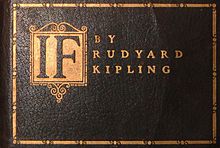If—
| by Rudyard Kipling | |

An edition of "If—" by Doubleday, Page & Company, Garden City, New York, 1910.
|
|
| First published in |
Rewards and Fairies |
|---|---|
| Publisher | Doubleday, Page & Company |
| Publication date | 1910 |
"If—" is a poem by British Nobel laureate Rudyard Kipling, written in 1895 and first published in Rewards and Fairies, 1910. It is a tribute to Leander Starr Jameson. The poem is written in the form of paternal advice to the poet's son, John. As poetry, "If—" is a literary example of Victorian-era stoicism.
The initial publication of the poem "If—" was in the "Brother Square Toes" chapter of the book Rewards and Fairies (1910), a collection of Kipling's poetry and short-story fiction. In the posthumously published autobiography Something of Myself (1937), Kipling said that his poetic inspiration for the poem was the military actions of Leander Starr Jameson, leader of the failed Jameson Raid (December 1895 – January 1896) against the Transvaal Republic to overthrow the Boer Government of Paul Kruger some 15 years prior to its publication. The failure of that mercenary coup d’état aggravated the political tensions between Great Britain and the Boers, which led to the Second Boer War (1899–1902).
If
If you can keep your head when all about you
Are losing theirs and blaming it on you,
If you can trust yourself when all men doubt you,
But make allowance for their doubting too;
If you can wait and not be tired by waiting,
Or being lied about, don’t deal in lies,
Or being hated, don’t give way to hating,
And yet don’t look too good, nor talk too wise:
If you can dream—and not make dreams your master;
If you can think—and not make thoughts your aim;
If you can meet with Triumph and Disaster
And treat those two impostors just the same;
If you can bear to hear the truth you've spoken
Twisted by knaves to make a trap for fools,
Or watch the things you gave your life to, broken,
And stoop and build ’em up with worn-out tools:
If you can make a heap of all your winnings
And risk it on one turn of pitch-and-toss,
And lose, and start again at your beginnings
And never breathe a word about your loss;
If you can force your heart and nerve and sinew
To serve your turn long after they are gone,
And so hold on when there is nothing in you
Except the Will which says to them: “Hold on!”
If you can talk with crowds and keep your virtue,
Or walk with Kings—nor lose the common touch,
If neither foes nor loving friends can hurt you,
If all men count with you, but none too much;
If you can fill the unforgiving minute
With sixty seconds’ worth of distance run,
Yours is the Earth and everything that’s in it,
And—which is more—you’ll be a Man, my son!
...
Wikipedia
